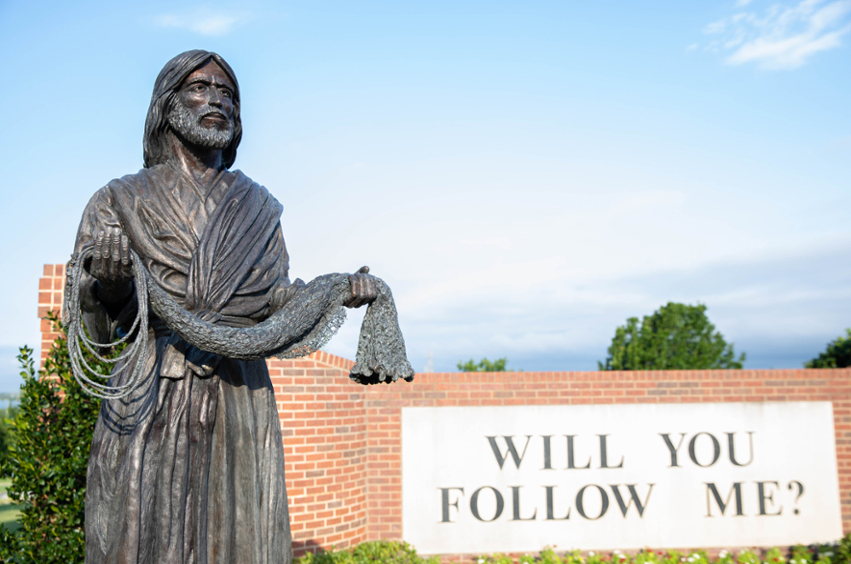Christ: Our Model for Glorifying God
This article is over six months old and may reference former titles for DBU faculty or staff, discontinued programs, or other details that have since changed. If you have any questions, please contact us at news@dbu.edu, or (214) 333-5172.

"The Incarnation is ... not only a revelation of God to humanity but also a revelation of humanity to humanity. In Jesus Christ we are learning what it means to be fully human."
-Timothy Tennent
From beginning to end, the life of Jesus was one unceasing offering of perfect obedience that glorified the Father. Whether in eating or drinking, resisting temptation against sin, speaking the truth boldly, or showing selfless compassion toward others and their need, He lived to honor the Father above Himself – “and became obedient unto death, even death on a cross."
We have been redeemed by Christ not only to have our sins forgiven and enjoy God's eternal blessings, but to be recreated in the image and likeness of Jesus. As Jesus imaged the Father (Colossians 1:15), we have been saved to image Jesus (Romans 8:29). He is the model of God's will for our human life.
So how does one glorify God? Look no further than Jesus, the Word of God made flesh who dwelt among us.
His Obedience
First and foremost, God is glorified in our willing obedience to the wisdom of His commandments. To believe in God is to trust His Word, and to trust His Word is to obey and follow it. Otherwise, we are putting ourselves above God, judging Him, and insisting that we can do better with our lives. This is why sin is so destructive. We cannot disobey the Creator and expect that His creation will not suffer.
Adam and Eve were tested in the Garden and disobeyed the word of the Lord, as did the chosen nation of Israel wandering in the wilderness and dwelling in the Promised Land. Jesus came and demonstrated perfect obedience, and unlike Israel (Deuteronomy 8), Jesus resisted temptation and overcame in the desert (Matthew 4). He remained obedient all throughout the course of His life, suffering rejection until His very last breath on the cross. His blood poured out in sacrifice atoned for our disobedience, but we were also saved by His goodness for His work of new creation.
We were made to obey God over all other rival gods, including life itself, and we glorify Him foremost with our obedience as it showcases what God is worth in our hearts. It is not enough that we hear the Word only, but that we do it as well (James 1:22). Early Christians were appropriately called followers of “the Way" (Acts 19:23), sanctified and set apart unto God to live an obedient life as citizens of a Kingdom that is not of this world (Philippians 3:20).
This is why we must study intently to know what God's will is in Scripture and especially as it is embodied perfectly for us in the life of Jesus, and then walk in His Spirit against the pressures of sin, the Devil, and the world. When we grow in our knowledge, love, and fellowship with God, obeying Him and allowing our lives to be conformed to the likeness of Christ, we will glorify living in union with Him as the most satisfying joy, freedom, and delight.
His Message
Jesus modeled glorifying God not only in His obedience to the commandments but also with the truth of His message. He invited others to enter the blessings of His Kingdom and taught the narrow way for all would-be disciples. His message proclaimed the grace and mercy of God while also boldly praising the righteous way of life and expressing displeasure toward what is evil.
We glorify God in imitation of Christ as ambassadors of His message by, first, proclaiming the truth of the life, death, and resurrection of Jesus as Savior and Lord. We also speak up to honor what is righteous and good and to warn against what is false and evil, not in arrogant judgment, but in the hope that all people will find peace with God and reconciliation with others through obedience to the truth.
There is no salvation apart from believing, and there is no believing without hearing the message (Romans 10:13-17). Spiritual darkness and blindness are exposed and overcome by the light of the truth. As the Living Truth said, “You shall know the truth, and the truth will set you free."
His Life of Prayer
It is difficult for us to imagine the Son of God needing to pray, yet we are told that Jesus often retreated to quiet places to commune with the Father (Luke 5:16) – even when there was more “work" to be done and more people clamoring for His help and attention. If Jesus devoted His life to prayer, how much more must we?
Prayer is an opportunity to connect with the source of our life and be refreshed in the intimate presence of divine love. Our life of prayer expresses a humble dependence upon God for all things, including praises and petitions. We take our needs before the throne of God – both for ourselves and for others – renewing our trust and surrender, and inviting Him to work in ways that we cannot.
There is no real strength or growth in the Christian life apart from abiding in prayer. It should be as consistent a part of our daily lives as the time we make for eating, and yet it is a practice that is so easily set aside until we become desperate. (The Biblical practice of fasting, in fact, reverses this to put greater focus on our need to be devoted to prayer.) The early Christian movement grew leaps and bounds with prayer, and every major reformation and revival in history since then has been preceded and accompanied with prayer.
To neglect a life of prayer is to lean on our own understanding and to rely pridefully on ourselves – as if we could accomplish more than an almighty God acting for and through us. As Augustine famously prayed, “Command what you will, but give what you command."
We need Him, and He desires to have fellowship with us. If we want to see His kingdom come in our own lives, in our communities, and throughout this world, we must pray – and pray with persistence and perseverance.
His Love for Others
Although deserving of glory and service in sharing equality with God (Philippians 2), Jesus humbled Himself to serve and bless the spiritual and physical needs of others. He healed, fed the hungry, and treated sinners and social outcasts with compassion and dignity – viewing all people as made and loved in the image of God. He valued people above religious traditions, and He befriended those that society had judged and rejected.
In a world characterized by a hunger for power, self-entitled and vengeful, Jesus displayed sacrificial generosity and kindness – even towards those who neglected, betrayed, and rejected Him. Fully confident in His Father's love, He poured Himself out for others.
If we want to glorify God as Christ did, we must genuinely love and value all people as precious in the sight of God. We must be mindful to see the various needs of others in our spheres of influence and act with kindness to serve and bless them (James 2:14-16), even when it costs us something. We should never consider anyone beyond the reach of God's redemptive love, recognizing that we are not any more deserving than others of the blessings of life and human flourishing.
We are quick to excuse our own faults but so eager to cast judgment on others, but Christ modeled for us incredible patience, withholding anger and retaliation, and showing mercy to His enemies. This is a hard thing to do, even impossible without God, because it goes against every natural fiber of our fallen humanity.
No one can honor the Father who does not also honor His Son (John 5:23), and the Son humbly honored and valued people with grace and kindness. To glorify God is to mirror His image, which is to love, and to love generously, as He does.
No one can glorify God as perfectly as Christ did, which is why we are in need of His mercy, but to believe in Jesus is to believe not only what He did for us but in the wisdom of the life that He modeled for us.
So, although imperfectly now, it is nevertheless the will of God that we be conformed more to the image of Jesus through faith. Whether at work, school, home, or anywhere that we take our bodies, we should gladly and perpetually offer them as “living sacrifices" (Romans 12:1) to glorify a worthy God in all that we say and do.
In honoring the Son through imitation of His obedience, His message, His life of prayer, and His love for others, we also honor the Father who so generously gave Him for us.
Dr. Michael Whiting is an Assistant Professor of Christian History and Leadership in the Cook School of Leadership at Dallas Baptist University. He also served as the Director of Written Content in University Communications.








